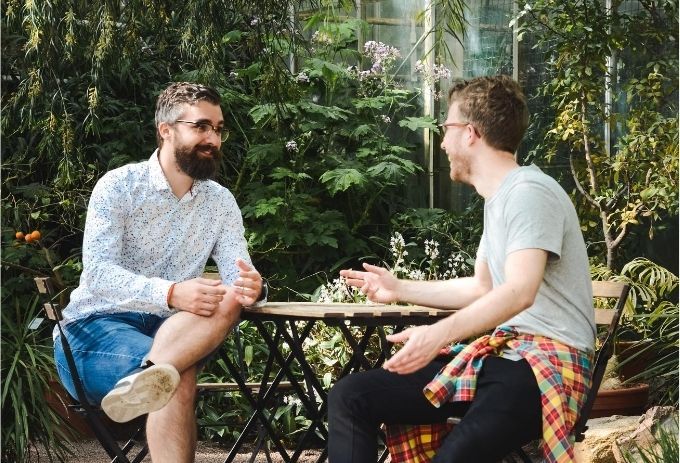August 7th is Friendship Day and a great time to celebrate the importance of friendship and all that it brings to our lives. Friendships help us feel connected to others and can positively impact our mental health near me.
How to maintain and nurture healthy friendships
Healthy friendships are an important part of life. They can provide support, companionship, a sense of belonging, and generally improve your mental health. But, like any relationship, friendships need to be nurtured and maintained. Here are some tips for keeping your friendships healthy:

- Make time for your friends. With busy schedules, finding time to get together can be difficult. But making an effort to see your friends regularly is important for maintaining a close connection.
- Communicate openly and honestly. Share your thoughts and feelings with your friends, and be open to hearing theirs. Honesty is the foundation of any strong relationship.
- Respect each other’s differences. Friendships are built on mutual respect. Even if you don’t always agree, it’s important to remember that you value each other’s opinions and perspectives.
- Be supportive. Good friends are there for each other during the good and bad times. If your friend is going through a tough time or their mental health isn’t the best, be there to lend a listening ear or a helping hand.
The benefits of friendship for mental health
Friendship is one of the most important relationships we have in our lives. Good friends are there for us when we need them and can help us navigate life’s challenges, as well as improve our mental health. Friendships can also provide an important source of social support, which is also essential for our mental health. In addition, a strong network of friends can help buffer against stress, loneliness, and anxiety, all potential mental health problems.

Research has also shown that people with close friendships are more likely to experience positive emotions and have a greater sense of life satisfaction. Even one good friend can do wonders for your mental health.
Tips for making new friends
Making friends can be daunting, especially if you’re new to an area or are starting a new school or job. However, having even one friend that you can truly count on is so important for our mental health. There are a few simple things you can do to help meet people and make lasting connections. First, put yourself out there, and don’t be afraid to talk with people you don’t know. You can start by asking about their day or commenting on something you have in common.
It’s also important to be open-minded and flexible; be willing to try new things and meet new people, even if they seem to have different interests from you at first. Finally, remember that friendships take time to develop, so don’t give up if you don’t click with someone right away.
While it’s important to be open-minded, it’s also important to be aware of anything that seems “off.”
The importance of being there for your friends
A true friend will listen to you, offer support and advice, and help you through tough times, and it’s important to reciprocate. If you’re having a bad mental health day (or they are), it’s comforting to know you have someone who understands. Whether they need help with a problem or just someone to talk to, being there for your friends shows that you care about them and that they can count on you.

Being there for your friends can also help to strengthen your relationships. Listening to your friends’ problems can give you a better understanding of their perspectives, and being able to offer advice and support can deepen your bond. So next time a friend feels down or isn’t doing great with their mental health, do your best to be there for them. It could make all the difference in the world.
Signs that a friendship may be toxic
Everyone has had a friend who is just a little bit too demanding, a little bit too critical, or a little bit too negative. But what do you do when your friend starts to cross the line into toxic territory? Here are some warning signs to watch out for:
Your friend is constantly putting you down. No one is perfect, but a friend should be someone who makes you feel good about yourself, not someone who repeatedly points out your flaws or gaslights you. If your friend is always finding ways to make you feel bad about yourself, it’s time to have a talk.
Your friend is always trying to control you. A healthy friendship is built on mutual respect, but a toxic friend will try to control every aspect of your life. If your friend is always telling you what to do and how to do it, it’s time to set some boundaries.
Your friend is always making everything about them. A good friend will listen to your problems and offer support, but a toxic friend will only want to talk about their own issues. If your friend only ever wants to talk about themselves, it might be time to move on.
If you’re noticing any warning signs in your friendship, don’t hesitate to have a conversation and set some boundaries. The best-case scenario is that your friend will be receptive to what you’re telling them and do some self-reflection.

The worst-case scenario is that your friend isn’t receptive to what you’re saying, and the friendship ends. But even in that case, it’s important to remember that you did what was best for yourself and your mental health. And if a friendship is really toxic, it’s better to let it go. Your mental health is more important.
How to deal with difficult friendships
Sometimes friendships may not be toxic, but they can still be challenging for many reasons.
Friendships are an essential part of life, but they can also be complicated. It’s normal to have disagreements with friends, but sometimes these disagreements can escalate into something more serious. If you find yourself in a difficult friendship, there are a few things you can do to try to improve the situation. First, it’s important to communicate openly and honestly with your friend.
Talk about what’s bothering you and try to resolve things. If you’re still having difficulty, it may be helpful to spend some time apart. Sometimes, distance can help to give both parties some perspective. Finally, if the friendship is still not working, it may be necessary to walk away. This can be a difficult decision, but it’s sometimes necessary to protect your own well-being.
If you’re really struggling with a friendship, it’s ok to seek professional help. Many people believe that therapy is only for people who are dealing with significant life trauma or mental illness. However, therapy can be beneficial for people struggling with day-to-day issues, such as managing a complicated friendship. If you constantly argue with your friend, feel left out or ignored, or ruminate on hurtful things they have said, it may be time to seek professional help.

A therapist can provide you with the tools you need to deal with conflict in a healthy way, set boundaries, and communicate effectively. In addition, therapy can help you to understand your own role in the friendship and how you can make positive changes. Therapy can give you the support you need to make your friendship thrive.
If you are struggling in your friendship, want feedback from an objective person, or want to work on communication skills, contact Serene Health. We provide a wide range of behavioral health and mental health services and would love to help.
Call us at 844-737-3638 or visit us at www.serenehealth.com to schedule an appointment. We also offer late evening and weekend appointments from our telehealth platform so that you can speak to a therapist online from the location of your choice.

